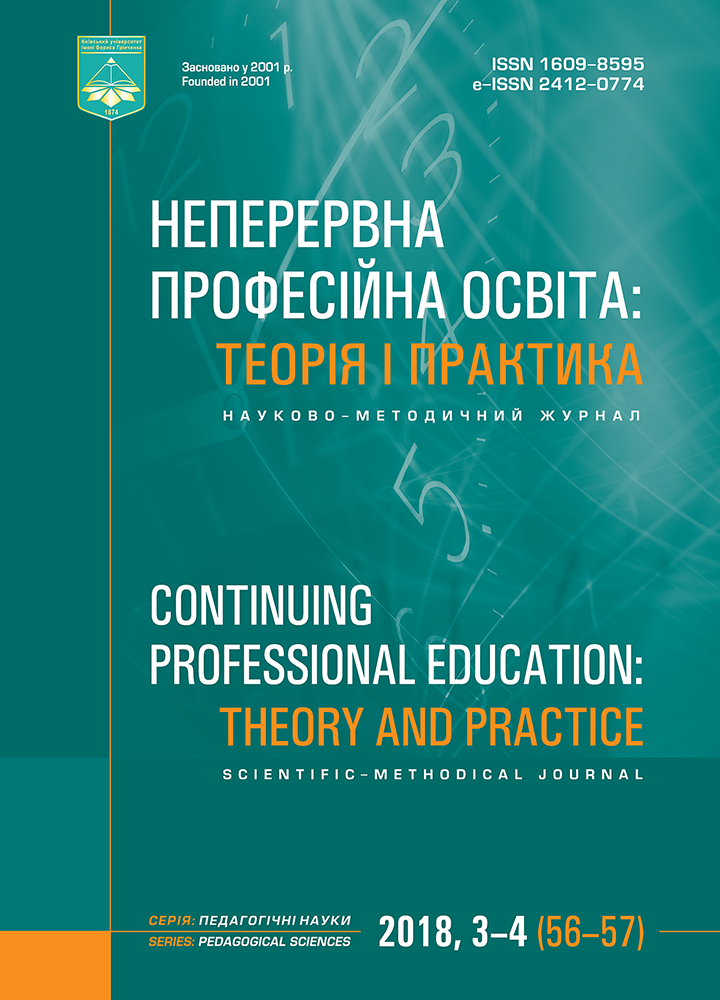ORGANIZATIONAL AND CONTENT ASPECTS OF PROVIDERS OF ADULT EDUCATION FUNCTIONING IN THE USA AND CANADA
DOI:
https://doi.org/10.28925/1609-8595.2018.3-4.111115Keywords:
adult education, Canada, center of adult education, center of knowledge spreading, content of education, corporate training, curriculum, programs of basic literacy, programs of professional orientation, providers, USA.Abstract
The article deals organizational and content aspects of providers of adult education functioning in the USA and Canada. Comparative analysis of understanding of concept «content of education» by Ukrainian and foreign scientists is conducted. Content of education is experience, which is acquired by personality and becomes subjective. Peculiarities of concept «curriculum» are analyzed. In Ukrainian pedagogics content of education is viewed a system of knowledge, practical skills and ways of activity, experience of creative work, outlook, moral and aesthetic ideas. Specifics of Canadian and American centers of education functioning is analyzed. Every state in the USA and every province in Canada have center of adult education and center of knowledge spreading. Interconnection between centers of adult education and centers of knowledge spreading is traced. Centers of adult education are aimed at creating conditions for personal and professional development of every man. Functions of adult centers of education are singled out. The main functions are the following: monitoring and analysis of adults’ educational needs. Differences between programs of general education and programs of professional training and career development are traced. Five blocks of programs of corporate education are analyzed. Programs of general education are aimed at acquisition of knowledge that was not obtained at school in reading, counting and writing. Programs for professional development of adults are aimed at workforce training, development of small business, increasing opportunities for skills development, integration of practical skills and theoretical knowledge at workplace, training of adults for changes in their career. Peculiarities of programs for professional and career development are practical orientation, personalization, openness, binary adaptation. Key components of programs of corporate learning are the following: development of basic skills and knowledge, training of managers and administrative personnel, investigation of science and technologies, selling of commodities and work with clients, general education. Basic skills presuppose not only reading, writing and counting, but also knowledge of sciences, skills of reading, writing and critical thinking. Second block is aimed at training of managers and administrative personnel. The third block is aimed at learning science and technologies, which is rather important in conditions of information society. The fourth block is aimed at teaching how to work with clients in coordination with technical and management education. The fifth block presupposes personal and professional development of workers.References
Bidyuk, N. (2014). Teoretyko-metodologichni zasady rozvytky osvity doroslyh u SHA [Theoretical-methodological basis of adult education development in the USA]. Pedagogical Sciences, 15, 8–12 (ukr).
Goncharenko, S. (1997). Ukrainskyi pedagogichnyi slovnik [Ukrainian Pedagogical Dictionary]. Kyiv, Ukraine: Lybid (ukr).
Lukyanov, L. B. (Ed). (2011). The concept of adult education in Ukraine. Nizhin, Ukraine: PP Lysenko M. M. (ukr).
Lerner, I. (1983). Sostav I structura soderzhaniya obrazovaniya na urovne teoreticheskogo predstavleniya [Content and structure of content of education at the level of theoretical vision]. Teoreticheskie osnovy soderzhaniya obshego srednego obrazovaniya. Moscow, Russia: Pedagogics (rus).
Ogienko, O. (2011). Kontseptualni zasady osvitu doroslyh u Kanadi [Conceptual basis of adult education in Canada]. Bulletin of Cherkasy university. Series: Peagogical sciences, 209, 25–29 (ukr).
Radionova, I. (2001). Filosofski konstrukty navchalnogo plany: amerikansky variant [Philosophical constructs of curriculum: American variant]. Scientific Papers of Kharkiv National University. Series: Social Philosophy, Pedagogics, Psychology, IX, 55–64 (ukr).
Savchenko, O. (1997). Dydaktika pochatkovoy shkoly [Dydaktics of Primary school]. Kyiv, Ukraine: Abrys (ukr).
Teryohina, N. (2014). Neformalna osvyta doroslyh: amerikansky dosvid dlya ukraini [Informal Adult Educatin: American Experience for Ukraine]. Sumy, Ukraine: SSPU named after A. S. Makarenko (ukr).
Tsentry osvity doroslyh. Osvity yak suspilna vidpovidalnist [Centers of Adult Education. Education as social responsibility]. (2011). Berlin, Germany: DVV (eng).
Chugai, O., Terenko, O., Ogienko, O. (2017). Methods that work: best practices of adult education in the USA. Advanced Education, 8, 72–77. DOI: 10.20535/2410-8286.105059 (eng).
Jarvіs, P. (2004). Adult Eduсatіon and Lіfelong Learnіng: Theory and Praсtісe. London, Great Britain: Routledge Falmer. DOI: https://doi.org/10.20535/2410-8286.109216 (eng).
Milana, M., McBain, L. (2014). Adult education in the United States of America: A critical examination of national policy (1998–2014). Encyclopedia: Journal of phenomenology and education. Vol. 18, № 40, 34–52. DOI: https://doi.org/10.6092/issn.1825-8670/4660 (eng).
Selman, G., Cooke, M., Selman, M., & Dampier, P. (2008). The foundations of adult education in Canada. Toronto, Canada: Thompson Educational Publish (eng).
Schmidt, S. (2016). Organization and Administration of Adult Education Programs: A Guide for Practitioners (Adult Education Special Topics: Theory, Research and Practice in Lifelong Learning). Charlotte, USA: Information Age Publishing (eng).
Schneider, K. (Ed.) (2014). Transfer of Learning in Organizations. Cham, Switzerland: Springer International Publishing. DOI: https://doi.org/10.1007/978-3-319-02093-8 (eng).
Sussmuth, R. (2009). Financing adult education for development: an introduction to adult education and development. DVV International series, 73, 55–60 (eng).
Downloads
How to Cite
Issue
Section
License
Copyright (c) 2020 Olena Terenko

This work is licensed under a Creative Commons Attribution-NonCommercial 3.0 Unported License.



